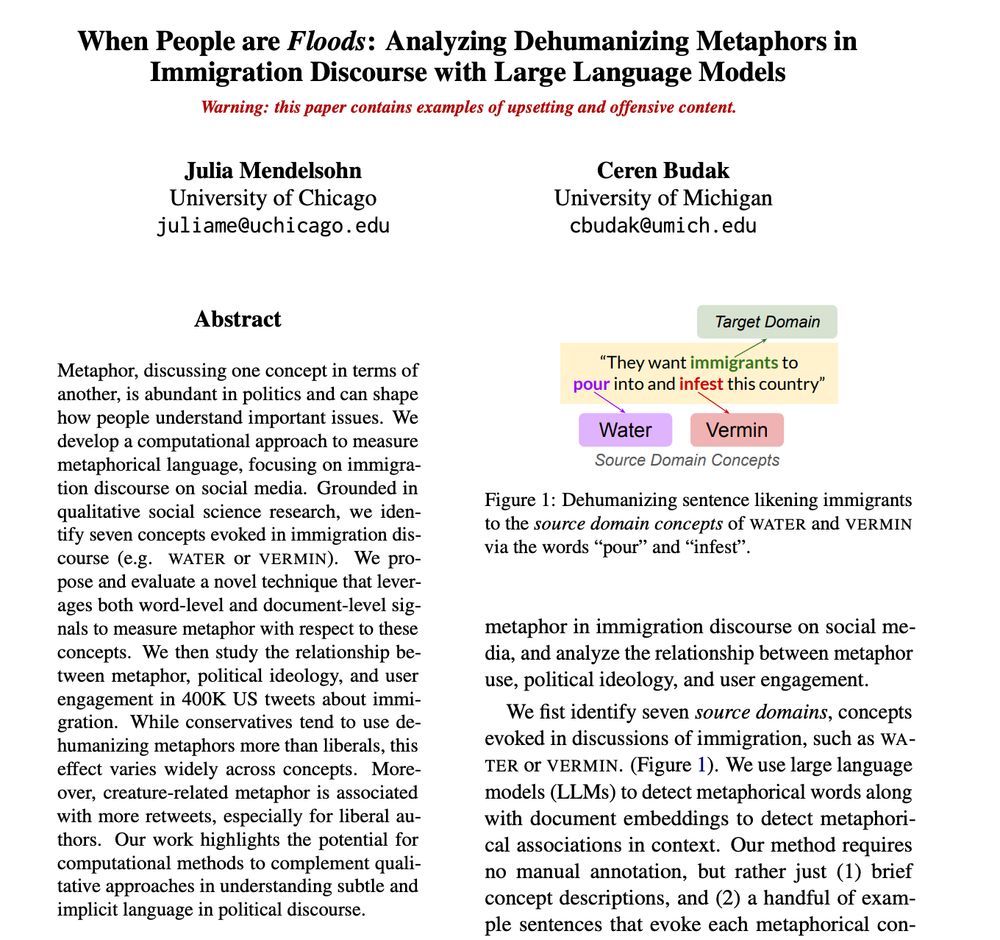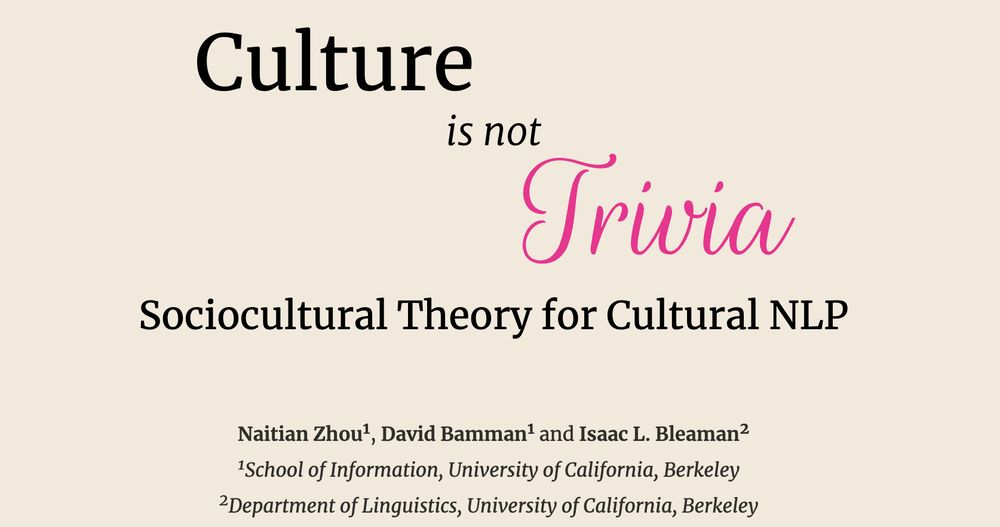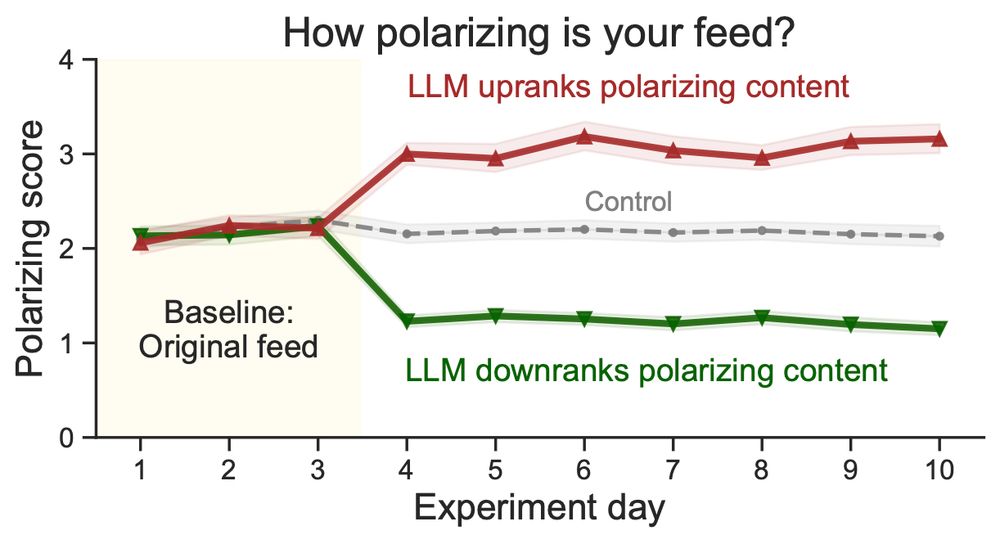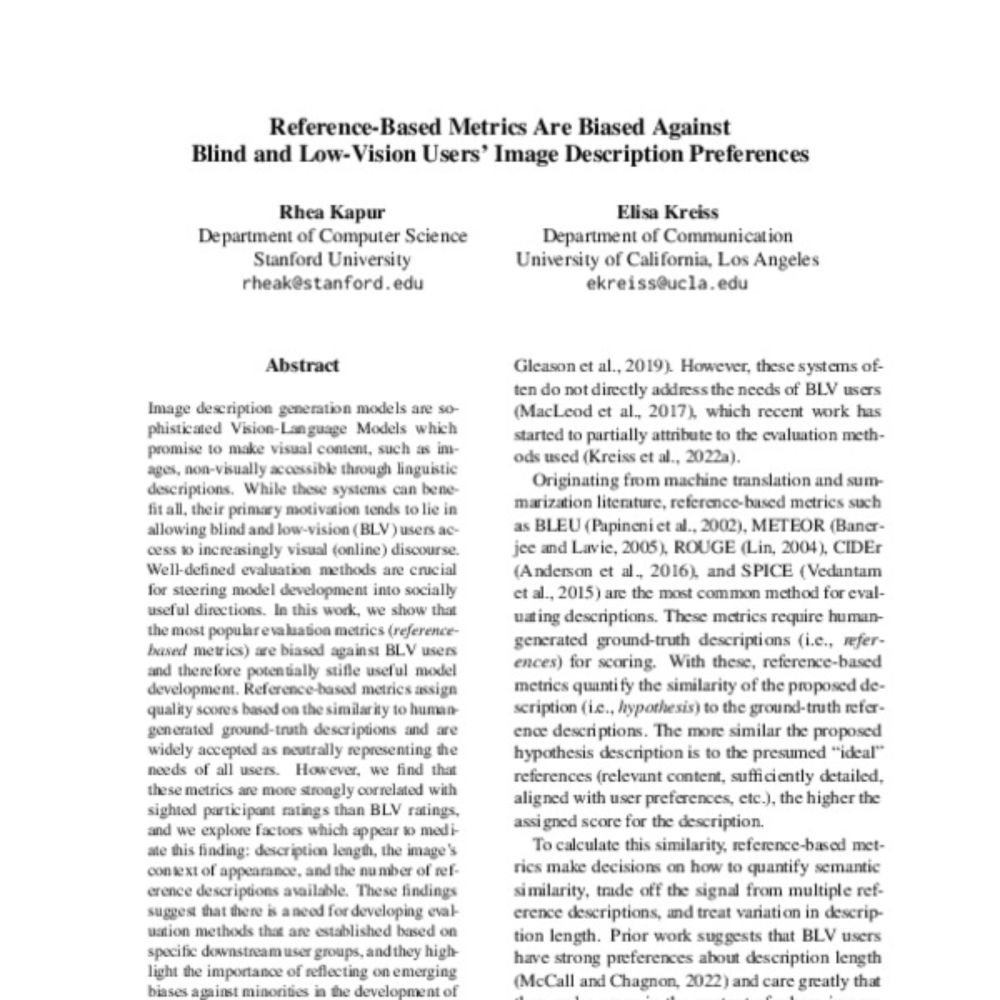fake news
02.06.2025 19:42 — 👍 2 🔁 0 💬 1 📌 0Omar Shaikh
@oshaikh.bsky.social
Ph.D. Student at Stanford HCI/NLP oshaikh.com interested in: ice cream, drinking coffee / chai, complaining, (conversational) grounding, human-ai interaction
@oshaikh.bsky.social
Ph.D. Student at Stanford HCI/NLP oshaikh.com interested in: ice cream, drinking coffee / chai, complaining, (conversational) grounding, human-ai interaction
fake news
02.06.2025 19:42 — 👍 2 🔁 0 💬 1 📌 0
Screenshot of top half of first page of paper. The paper is titled: "When People are Floods: Analyzing Dehumanizing Metaphors in Immigration Discourse with Large Language Models". The authors are Julia Mendelsohn (University of Chicago) and Ceren Budak (University of Michigan). The top right corner contains a visual showing the sentence "They want immigrants to pour into and infest this country". The caption says: Figure 1: Dehumanizing sentence likening immigrants to the source domain concepts of Water and Vermin via the words "pour" and "infest". The abstract text on the left reads: Metaphor, discussing one concept in terms of another, is abundant in politics and can shape how people understand important issues. We develop a computational approach to measure metaphorical language, focusing on immigration discourse on social media. Grounded in qualitative social science research, we identify seven concepts evoked in immigration discourse (e.g. "water" or "vermin"). We propose and evaluate a novel technique that leverages both word-level and document-level signals to measure metaphor with respect to these concepts. We then study the relationship between metaphor, political ideology, and user engagement in 400K US tweets about immigration. While conservatives tend to use dehumanizing metaphors more than liberals, this effect varies widely across concepts. Moreover, creature-related metaphor is associated with more retweets, especially for liberal authors. Our work highlights the potential for computational methods to complement qualitative approaches in understanding subtle and implicit language in political discourse.
New preprint!
Metaphors shape how people understand politics, but measuring them (& their real-world effects) is hard.
We develop a new method to measure metaphor & use it to study dehumanizing metaphor in 400K immigration tweets Link: bit.ly/4i3PGm3
#NLP #NLProc #polisky #polcom #compsocialsci
🐦🐦

Culture is not trivia: sociocultural theory for cultural NLP. By Naitian Zhou and David Bamman from the Berkeley School of Information and Isaac L. Bleaman from Berkeley Linguistics.
There's been a lot of work on "culture" in NLP, but not much agreement on what it is.
A position paper by me, @dbamman.bsky.social, and @ibleaman.bsky.social on cultural NLP: what we want, what we have, and how sociocultural linguistics can clarify things.
Website: naitian.org/culture-not-...
1/n

New paper: Do social media algorithms shape affective polarization?
We ran a field experiment on X/Twitter (N=1,256) using LLMs to rerank content in real-time, adjusting exposure to polarizing posts. Result: Algorithmic ranking impacts feelings toward the political outgroup! 🧵⬇️

I'm excited to kick off my Bluesky presence with wonderful news: Our paper "Reference-Based Metrics Are Biased Against Blind and Low-Vision Users' Image Description Preferences" won a Best Paper Award at the NLP for Positive Impact Workshop at EMNLP! Read it here: aclanthology.org/2024.nlp4pi-...
24.11.2024 18:39 — 👍 194 🔁 20 💬 4 📌 2
Screenshot of the abstract for the paper, "Once More, With Feeling: Measuring Emotion of Acting Performances in Contemporary American Film". The abstract reads: "Narrative film is a composition of writing, cinematography, editing, and performance. While much computational work has focused on the writing or visual style in film, we conduct in this paper a computational exploration of acting performance. Applying speech emotion recognition modes and a variationist sociolinguistic analytical framework to a corpus of popular, contemporary American film, we find narrative structure, diachronic shifts, and genre- and dialogue-based constraints located in spoken performances.
🎬 Coming soon to a theater near you!🍿
Film is a semiotically rich medium: meaning is conveyed through the music, visuals, language, and more. A new paper from me and @dbamman.bsky.social explores what it means to computationally study performance in film.
Website: naitian.org/once-more-wi...
1/n